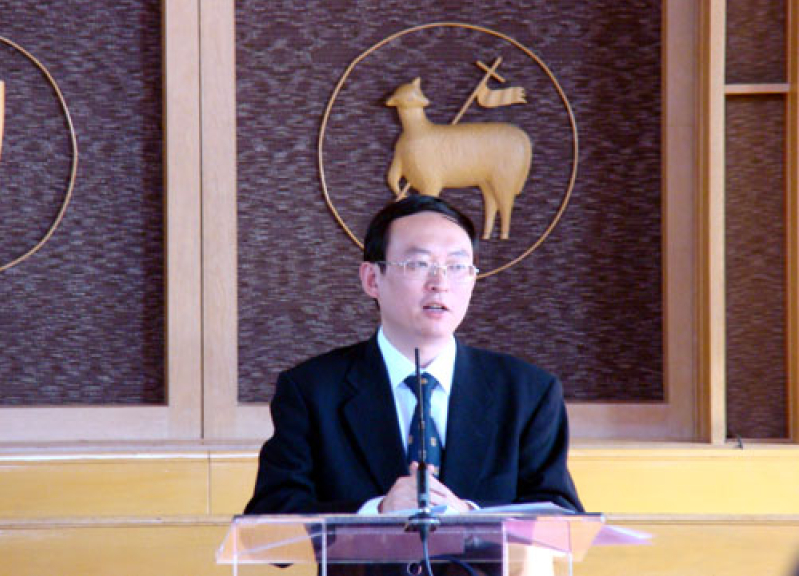
One of the three house church leaders who met with former U.S. President George W. Bush in 2006 gave an insightful speech on the present situation of China’s churches and its gospel mission earlier this month.
Visiting Canada for the first time, Yu Jie spoke on the topic of Revival of Urban Churches in China and the Missions of Christian Intellectuals in the Public Square at the North American Chinese Baptist Church in Vancouver on Oct. 3.
Revival Starting from Rural Churches to Urban Churches
Yu Jie first divided the 30 years of economic reform into three different periods. The first period began from the initiation of the economic reform in 1978 until 1988, during which the communists relinquished control on certain areas of the society, made adjustments on social policies, and the rural churches developed rapidly.
The second important water-shedding point was the period after the crackdown of Tiananmen Square Incident in 1989, where many mainland intellectuals came to the west, converted to Christianity and believed in the Lord, and many of them became pastors or ministers, who are now ministering their own churches.
He said that believers in China were able to listen to these minister’s sermons through various channels and received training through that. In the meantime, China’s society is gradually urbanizing, so the speed at which rural churches develop has slowed down while the urban churches are experiencing a revival, continuing on the baton race.
The third period began from year 2000 until now, said Yu. In a rapidly changing city, the people face various kinds of crisis, including career, finances, family, marriage, and etc, so their desire for faith is unprecedented.
Until now, the urban churches are experiencing a greater revival than those in the rural areas. In addition, after the Sichuan earthquake last year, numerous house churches participated in the disaster relief efforts, providing medical and counseling services, so they are gradually coming out into the public arena. Some churches even hang up their names and pass out gospel tracts.
The Appearance of Christian Intellectuals in Public Square and Their Social-Cultural Mandate
Meanwhile, developing along side with the urban churches is the appearance of Christian intellectuals in the public square since year 200. He believes that ever since then there are at least four areas where Christian intellectuals in the public can make use of their publicity.
First, it is the cultural and literary arts creation, he said. Since Robert Morrison first entered China two centuries ago, Protestantism has never become main stream, and one of the reasons is because it lacked culture and literary arts creations, such as writing, music, paintings, and etc.
He believes that pioneering the culture is still the precursor to Christian faith becoming rooted into China, and the reconstruction of culture will connect the biblical truth with the realities of life, becoming a bridge between faith and life.
Second, they must be dedicated to establish a new value system, moral-ethics, and system of culture, replacing man-centered to God-centered beliefs and allowing love and justice to fill the land, and covering every place where there are Chinese people living.
He stated that church is not a lonely island in the vast sea, nor is it a secret garden segregated from the world, but it must become just as the Lord Prayer says, “Thy will be done on earth as it is in heaven.”
Third, they should have the responsibility to advocate for religious legislation, complete a lawful registration, and receive a legal status.
Lastly, they must actively seek for a complete religious freedom, including the rights to openly proselytize, to enter jobs in the education, charity, and social-service fields.
Yu said that open proselytizing is an inalienable part of religious faith, which also includes the rights of churches and Christians establishing publications, newspaper magazines, television shows, radio stations, internet, and other forms of media.
In conclusion, the Yu pointed out that there isn’t any time in history like now when the churches in mainland are growing at an incredible speed every year. So many people who are longing and seeking for the truth are waiting for the gospel.
He hopes that the house churches in mainland can step by step head towards openness and become the blessing to the people in this world.
About Yu Jie:
Yu Jie was born on 1973 in Chengdu, Sichuan. He began his writing career at the age of 13 year old. In 1992, he entered Beijing University with a Chinese Major. In 2000, he received a received a Masters degree in literature. While studying at Beijing University, he produced literary commentaries and thought sketches of over two million words. He was viewed by readers as one of the few authors who dare to speak the truth, and as a public intellectual who cares for freedom of speech, citizen’s rights, and religious freedom.
In 2003, Yu became a believer and was baptized, after which, his literary focus broadened to include topics such as Christian faith and transformation of society, changes of intellectual’s spirits, conservative values in the future of China’s horizon, and etc. In 2005, after he was banned from publishing any works in mainland China, his writings was published on overseas websites and publications, an example is that on Boxun.com his person literary works had over four million clicks.
Because of his publicized writings and active participation in human rights activities, he was nominated numerous times to be among the hundred public Chinese intellectuals who influenced China the most. In 2006, together with other well-known Chinese human rights activists, Yu met with former U.S. President George W. Bush and shared his personal testimony and the situation of religious freedom in China.
Reporter Luke Leung translated the article.







